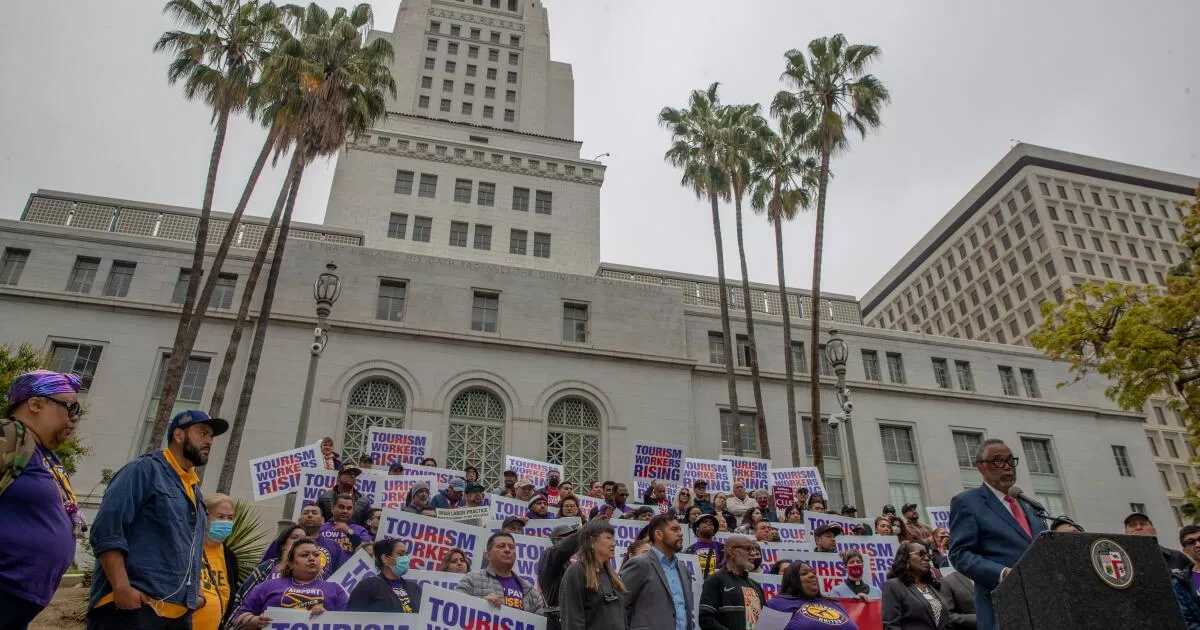SACRAMENTO — Just under half of California voters support Proposition 32, the measure to increase California’s minimum wage to $18 an hour, a warning sign about its fate in next week’s election, according to new polling results released Friday.
Forty-seven percent of likely voters and those who have already cast ballots backed the measure, according to a survey from the UC Berkeley Institute of Governmental Studies co-sponsored by The Times. Thirty-nine percent intend to vote “no,” and 14% are undecided.
“It’s very close,” said Mark DiCamillo, director of the Berkeley poll. “It boils down to: who is getting out to vote? The turnout really matters here.”
The measure would increase the state’s current $16 minimum wage by two dollars for all employees by 2026. Supporters of the proposal, including the Service Employees International Union, say that despite recent industry-specific, minimum wage mandates, more than 2 million people earn less than $18 an hour and are struggling to afford to live in one of the most expensive states in the country. But opponents, such as the California Chamber of Commerce, warn it could tank businesses or pass costs on to consumers.
The Berkeley poll also showed that a solid majority of 60% of voters remain in support of Propostion 36, which would impose stricter penalties for retail theft and crimes involving fentanyl. Opposition to Proposition 33, which would expand local government authority to enact rent control ordinances, is growing, with 45% of likely voters now intending to vote against it.
The minimum wage proposition could be a toss-up, as polling shows that many voters remain uncertain the week before election day. The measure comes after a new state law mandates that fast-food workers earn $20 an hour and healthcare workers earn at least $25 an hour, and cities such as West Hollywood already require more than $19 an hour.
California’s minimum wage is $16 and is adjusted with inflation — among the highest rate in the country and more than twice as much as the federal requirement’s. But many Californians are still struggling with a skyrocketing cost of living. The current minimum wage pencils out to about $33,000 a year, and the average cost of living is about $53,082 a year, according to recent federal data.
While the measure lacks a majority of support just days before Tuesday’s election, the percentage of supporters increased by 10% since a similar poll last month.
The fate of the initiative will probably depend on who votes in the final hour, DiCamillo said. Democrats and young and Black voters are among those who support Proposition 32, as well as residents of Los Angeles, San Francisco and other big cities. Republicans, however, oppose the measure nearly six to one, and residents of rural areas like the Central Valley are least likely to support it.
Millionaire investor and anti-poverty activist Joe Sanberg spearheaded Proposition 32 and said he is “encouraged” by the latest poll results. He pointed to a new study by the Center on Wage and Employment Dynamics at UC Berkeley that showed higher fast-food salaries led to modest price increases, just cents on the hamburger, and did not lead to job cuts.
“The opposition has been lying about a false narrative that inflation has been the result of increased wages. The reality is prices have gone up because of corporate price gouging,” Sanberg said. “I hope that everyone can agree we all want better pay and more jobs and stable prices.”
But some companies have pointed to higher minimum wage mandates as a reason for increasing prices, and some restaurant owners who have closed their doors have cited labor costs.
Chris Thurnberg, an economist who does work for the California Restaurant Assn., a leading opponent of the measure, said Californians are tired of “paying more for everything” and are leery that a minimum wage hike will affect their wallets.
“One of the big mistakes here is to think that this just shows up in tiny little parts of the economy. It shows up everywhere,” he said. “We’ve hit a point where you’re chasing your own tail. When does it stop?”
The Berkeley poll is the last before the election and was conducted Oct. 22-29 in English and Spanish among more than 4,000 Californians considered likely to vote or who had already voted.
